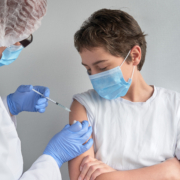Puberty Blockers: a societal experiment built on sand
 Stories abound on social media. Documentaries and podcasts open the lid on the growing phenomenon of gender dysphoric children presenting in greater and greater numbers. In our field many of us hear first-hand the heart-breaking stories of children struggling with their gender identity and share a deep concern for their welfare.
Stories abound on social media. Documentaries and podcasts open the lid on the growing phenomenon of gender dysphoric children presenting in greater and greater numbers. In our field many of us hear first-hand the heart-breaking stories of children struggling with their gender identity and share a deep concern for their welfare.
Last year around 2,000 transgender or gender questioning children (a 300 percent increase in three years) were seen by the Tavistock and Portman NHS Trust’s Gender Identity Development Service (GIDS) with around 15% of them approved for puberty blockers (Gonadotropin-Releasing Hormone agonists, GnRHa).
In 2008 the Endocrine Society approved puberty blockers for transgender adolescents as young as 12 years old. Since 2010 the GIDS launched a trial of puberty blockers for children in their early teens with gender dysphoria. Guidelines require puberty to have begun before any intervention is agreed. This is because gender dysphoria may resolve once puberty begins. Indeed a prospective study of 77 gender dysphoric children referred to one clinic found that after 3.4 years of follow-up 27% remained gender dysphoric. Other studies suggest that nearly 90% of prepubertal GID clinic attenders who receive no intervention will eventually lose their desire to identify with the non-birth sex. However, of the children placed on puberty blockers in the Dutch clinic that pioneered this treatment, every single one of them persisted in their transgender identity. And of course, for these children who persist in their transgender identity, taking puberty blockers and then cross-sex hormones, leads to irreversible infertility.
Puberty blockers have not been certified as effective or safe in the treatment of gender dysphoria by the National Institute for Health and Care Excellence (NICE) or their manufacturers. They remain an experimental treatment, but new prescriptions were recently running at 300 per year.
Presumably there is evidence that puberty blockers work?
One might think that for doctors to prescribe such medication there is an evidence base that underpins it. After all, those of us in medicine have been trained to provide evidence-based treatment and the public should expect that treatments offered to them are safe and will improve their lives. This is where things get interesting.
A recent review by Oxford Professor Michael Biggs critiques the study instigated by the GIDS to administer experimental drugs to children suffering from gender dysphoria. He concludes that ‘it showed no evidence for the effectiveness of GnRHa…in addition, there is unpublished evidence that…puberty blockers exacerbated gender dysphoria.’ And of further concern, he found that follow up of over-18s has not been possible because ‘transgender activists successfully lobbied the NHS to provide new numbers to patients as well as to change the ‘gender’ on their medical records.’
A recent evidence review in the BMJ found ten studies that analysed the effects of puberty blockers. All lacked either significant blinding or controls, and one included controls that ‘were inadequate as relatives and friends of the participants were asked to participate, serving as age-matched controls’.
A group of paediatricians recently wrote in the Archives of Disease in Childhood, warning that GnRHa treatment is a momentous step in the dark. They have three main concerns:
- Young people are left in a state of ‘developmental limbo’ without secondary sexual characteristics that might consolidate gender identity. With over 90% of young people attending endocrinology clinics for puberty-blocking intervention proceeding to cross-sex hormone therapy, their use ‘may prevent some young people with GD from finally becoming comfortable with the birth sex.’
- Puberty blocker use threatens the maturation of the adolescent mind. Puberty plays a key role in structural brain development and its delayed timing can be linked with an increase in adverse health-related behaviours and in mental health status during adolescence. It is misleading to suggest that puberty blockers are reversible. Going through a developmental process at age 20 that should take place at age 10 is not the same thing.
- Puberty blockers are being used in the context of profound scientific ignorance. Whilst puberty blockers are used for treatment of pathological precocious puberty, it is presumptuous to extrapolate these observations to a use that suppresses normal puberty.
So why are these unproven and possibly dangerous medications being prescribed to children?
The reality is that the NHS is being overrun by increased demand, particularly in this area (see the recent resignation of a Tavistock governor in protest) and assessments are therefore done hastily without recourse to the usual ‘formulation’ (a full psychological understanding of the person in front of us).
In addition, even a cursory glance at social media tells us that fear dominates discussion of gender identity in our culture, and this has affected the medical community and the NHS. It simply isn’t true that the choice is between conversion and suicide, when at best the outcomes for those who have transitioned are no better and possibly worse than prior to surgical transition. It also isn’t wise to allow such momentous choices to be made by such young minds. Young children aren’t allowed to vote, drink alcohol, smoke or have sex because we know that the immature brain is unable to make reliably rational decisions.
Medics are trained in the rigours of evidence-based medicine. And yet, as I have heard time and time again in private, we are treating children with puberty blockers when we know the evidence is uncertain and there is potential for harm. I have no doubt that those who work in GIDS have good intentions. They are faced with difficult decisions daily and we must recognise the complexities and uncertainty that they face. The number of referrals to the service is overwhelming and many of the people we see are in real pain and looking for answers.
Is bodily sex relevant anymore?
Interestingly for the Christian, the science supports the understanding that we are embodied selves. Children do not have to create an identity or question their very core sense of self as a boy or a girl. Indeed, transgender ideology is Gnosticism re-stated – the idea that biological sex plays second fiddle to a self-proclaimed, subjective gender identity, and that the sex of one’s body is mutable or even irrelevant.
But we are allowing this ideology to drive the medical profession to experiment on vulnerable children. It is our role as medics to provide effective treatment free from external pressures. Changing bodies to conform to thoughts and feelings is at best problematic. Instead, the best treatments focus on helping people accept and even embrace the truth about their bodies and reality.
There is no well-established scientific consensus about the efficacy or safety of using puberty-blocking agents for children with gender dysphoria. It is a drastic and unprecedented measure. Further work is needed, and researchers should be permitted to ask these questions rather than being labelled as ‘politically incorrect’ or worse, ‘transphobic’.
Our children deserve treatment based on firm foundations, not on sand.












Leave a Reply
Want to join the discussion?Feel free to contribute!